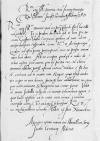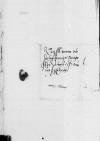Reverendissimo atque
Illustrissimo Domino, domino ⌊Ioanni Decuriis Dantisco⌋ episcopo Varmiensi et cetera, domino meo perquam colendo
Reverendissimo atque illustrissimo domino domino Ioanni Dantisco, Episcopo Varmiensi Iacobus Gratianus Alderetus salutem dicit. Reverendissime atque Illustrissime Domine, domine mi perquam colende. Post humillimam commendationem.
Etsi pridem dederam ad te litteras per dominum ⌊Gasparem Vayler⌋ Germanum, quibus ad tuas ad me missas latissime respondebam, tamen reverendissimum dominum ⌊archiepiscopum Londensem⌋ ad istas partes proficiscentem non sum passus vacuum meis litteris abire. Ab eo accipies quidquid a nobis de rebus nostris scire averes, qui tum peritia earum, tum aliorum sermone edoctus, potest optimam rationem reddere. De his etiam ⌊⌋ ad te ⌊mater⌋ mea et ⌊uxor⌋, quas recte valentes nuper in vico dimisi. Fortasse huc adducturus, eo citius, quo mihi voluntas et benignitas tua certior fuerit. Valet etiam socrus ⌊Isabella Delgada⌋ cum ⌊marito⌋ ⌊Salamanticae⌋ agens, quae hanc epistolam ad te mittit meis annexam, scilicet nimirum exemplo aliarum. Et valeat quam felicissime Reverendissima Dominatio Tua, cui me humillime commendo.
⌊Toleti⌋, III-o ante Idus Novembris.
Agnoscis, opinor, manum tui humillimi servi ⌊Iacobi Gratiani Aldereti⌋

